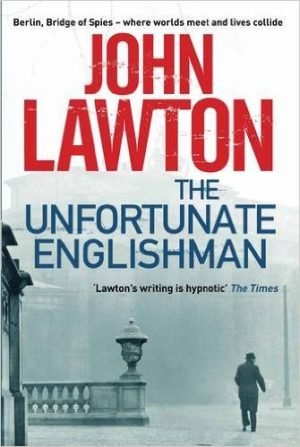
John Lawton is not the most prolific author, so when a new book comes along it is something of an event. He made his name with the excellent Frederick Troy novels, and in 2014 he gave us a new character in Then We Take Berlin – the enigmatic soldier, black marketeer and spy, Joe Wilderness.
Lawton just loves the post-World War II years and the setting here is Berlin during the mid-60s. The infamous wall is yet to be built, and Wilderness (real name Holderness) is languishing in a German jail as a result of his criminal activities. Along comes his father-in-law, the delightfully named Alec Burne-Jones, and he is carrying a Get Out Of Jail Free card. He lays the card on the table, and Joe is once again a free man. However, there is a price to be paid because Burne-Jones works for British intelligence and Wilderness must work for him doing some unofficial jobs for the British government.
The book’s title is a cunning one. At first we assume the unfortunate fellow must be Geoffrey Masefield. Masefield is a dull but very clever metallurgist sent to Moscow on the pretext of buying an obscure product called indium. The Russians have masses of the stuff, but as no-one has discovered a use for it they are happy to sell it to the mild-mannered Masefield. In reality, Masefield has another brief, which is to find details about the Soviet nuclear missile programme and report back to London.
There is another candidate for the titular role, and here Lawton shows his subtlety and the strong vein of irony which runs through all his books. The story returns to the last months of 1945 and with Europe pretty much in chaos a disoriented and malnourished RAF officer is discovered wandering aimlessly not far from the prisoner of war camp where he was incarcerated. Bernard Alleyn is repatriated, feted as a war hero and given a secret government job. But Alleyn is not who he claims to be. In reality, he is Leonid Liubimov, a Russian intelligence agent.
Needless to say, both Masefield and Alleyn come to grief. The two spies end up in Wormwood Scrubs and the Lubyanka, respectively. Both can reasonably claim to be the unfortunate Englishman.
Meanwhile, Joe Wilderness is up to his usual tricks on both sides of the East-West divide in Berlin, but his ‘day job’ requires him to engineer a classic exchange of prisoners – one unfortunate Englishman for another, so to speak. As readers of the Frederick Troy books will know, Lawton loves to include real life characters in his books. Thus we have brief appearances from Vice President Lyndon Johnson, Berlin Mayor Willie Brandt, and a fleeting drive-by from Nikita Kruschev.
As Joe attempts to make the prisoner swap as painless as possible, he cannot resist a nice little scam on the side, and this time it involves a large and valuable lorry load of vintage Claret. We know things are going to go wrong and the action, the dialogue, the suspense and the compassion are described with flair by Lawton. He manages to weave together all the elements of a le Carre-style Cold War thriller with the tough strands of good old-fashioned criminality. Joe Wilderness is every bit as brave, clever, devious – and anti-heroic – as the most famous black marketeer of all – Harry Lime himself.
Grove Press
Print/Kindle/iBook
£4.68
CFL Rating: 5 Stars









